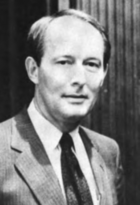Lamar Alexander facts for kids
Quick facts for kids
Lamar Alexander
|
|
|---|---|
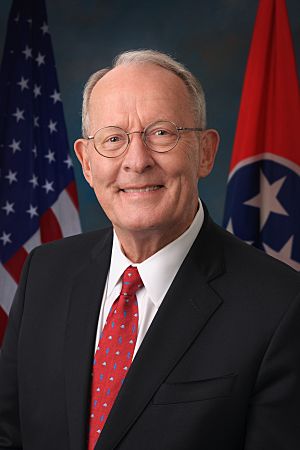
Official portrait, 2017
|
|
| United States Senator from Tennessee |
|
| In office January 3, 2003 – January 3, 2021 |
|
| Preceded by | Fred Thompson |
| Succeeded by | Bill Hagerty |
| Chair of the Senate Health, Education, Labor and Pensions Committee | |
| In office January 3, 2015 – January 3, 2021 |
|
| Preceded by | Tom Harkin |
| Succeeded by | Patty Murray |
| Chair of the Senate Republican Conference | |
| In office December 19, 2007 – January 26, 2012 |
|
| Leader | Mitch McConnell |
| Preceded by | Jon Kyl |
| Succeeded by | John Thune |
| 5th United States Secretary of Education | |
| In office March 22, 1991 – January 20, 1993 |
|
| President | George H. W. Bush |
| Deputy | David T. Kearns |
| Preceded by | Lauro Cavazos |
| Succeeded by | Richard Riley |
| Chair of the National Governors Association | |
| In office August 6, 1985 – August 26, 1986 |
|
| Preceded by | John W. Carlin |
| Succeeded by | Bill Clinton |
| 45th Governor of Tennessee | |
| In office January 20, 1979 – January 17, 1987 |
|
| Lieutenant | John Wilder |
| Preceded by | Ray Blanton |
| Succeeded by | Ned McWherter |
| 2nd President of the University of Tennessee system | |
| In office 1988–1991 |
|
| Preceded by | Edward J. Boling |
| Succeeded by | Joseph E. Johnson |
| Personal details | |
| Born |
Andrew Lamar Alexander Jr.
July 3, 1940 Maryville, Tennessee, U.S. |
| Political party | Republican |
| Spouse |
Leslee Buhler
(m. 1969; died 2022) |
| Children | 4 |
| Education | Vanderbilt University (BA) New York University (JD) |
Andrew Lamar Alexander Jr. (born July 3, 1940) is an American politician and lawyer. He served as a United States senator for Tennessee from 2003 to 2021. As a member of the Republican Party, he was also the 45th governor of Tennessee and the 5th United States Secretary of Education.
Born in Maryville, Tennessee, Alexander earned degrees from Vanderbilt University and the New York University School of Law. He first ran for governor of Tennessee in 1974 but was not successful. He ran again in 1978 and won, serving two terms.
Later, Alexander became the president of the University of Tennessee. In 1991, President George H. W. Bush appointed him as the U.S. Secretary of Education. He also ran for president in 1996 and 2000 but did not win his party's nomination. In 2002, he was elected to the U.S. Senate, where he served for 18 years before retiring in 2021.
Contents
Early Life and Schooling
Lamar Alexander was born and grew up in Maryville, Tennessee. His mother was a preschool teacher, and his father was a high school principal. In high school, he was class president and showed an early interest in government.
In 1962, Alexander graduated from Vanderbilt University with a degree in Latin American studies. He was a top student and a member of the track and field team. He also edited the student newspaper. In 1965, he earned his law degree from the New York University School of Law.
Beginning a Career in Politics
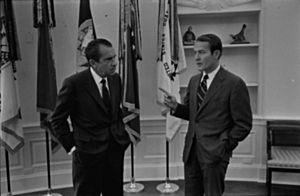
After law school, Alexander worked for a judge and then as an assistant for U.S. Senator Howard Baker. In 1969, he began working in the White House for President Richard Nixon's team.
He returned to Tennessee in 1970 to manage a successful campaign for governor for Winfield Dunn. Alexander then started a law firm in Nashville. He ran for governor himself in 1974 but lost to Ray Blanton. After the election, he went back to practicing law and was named one of the "200 Faces of the Future" by TIME Magazine.
Governor of Tennessee
Alexander ran for governor again in 1978. To get attention, he walked over 1,000 miles across Tennessee. He wore a red and black flannel shirt, which became his signature look. He won the election and became the 45th governor of Tennessee.
A few days before he was supposed to take office, Alexander was sworn in early. This was done to stop the outgoing governor, Ray Blanton, from making controversial decisions.
First Term as Governor
As governor, Alexander worked to improve Tennessee's government and economy. He gave state workers a raise and focused on bringing new businesses to the state. His biggest success was convincing the car company Nissan to build a large factory in Smyrna. This brought many jobs to the area. He also helped bring a General Motors factory to Spring Hill.
Second Term as Governor
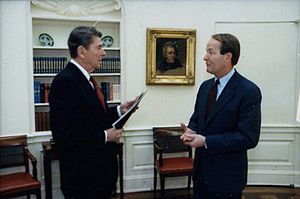
In 1982, Alexander was re-elected for a second term. During this time, he focused on improving education. His "Better Schools" program created standards for basic skills and added more math, science, and computer classes. He also created a plan to give extra pay to top-performing teachers.
In 1986, he started the "Better Roads Program" to fix and build highways across the state. This program was paid for by a small increase in the state's gasoline tax. He could not run for a third term in a row, so he left office in 1987.
Life After Being Governor
After his time as governor, Alexander and his family moved to Australia for a short time. When he returned, he became the president of the University of Tennessee from 1988 to 1991.
U.S. Secretary of Education

In 1991, President George H. W. Bush asked Alexander to be the United States Secretary of Education. In this role, he worked on national education goals. He served until 1993.
During this period, Alexander also became successful in business. He was involved with companies that provided child care and educational services.
Presidential Campaigns
Alexander ran for President of the United States twice, in 1996 and 2000. In both campaigns, he tried to win the Republican Party's nomination but was not successful. He ended both of his campaigns in his home state of Tennessee.
Serving in the U.S. Senate
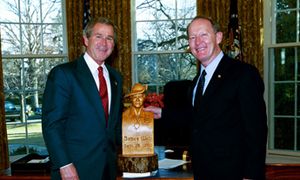
In 2002, Alexander ran for an open U.S. Senate seat in Tennessee and won. He became the first person in Tennessee to be elected as both governor and senator. He was re-elected in 2008 and 2014.
As a senator, Alexander was known for working with members of both political parties. He served in several leadership roles for the Republican Party. From 2015 to 2021, he was the chairman of the Senate Committee on Health, Education, Labor, and Pensions.
One of his major achievements was the Every Student Succeeds Act in 2015. This law replaced the No Child Left Behind Act and changed how the federal government was involved in local schools.
In 2018, Alexander announced that he would not run for re-election in 2020 and retired from the Senate in January 2021.
Key Political Views
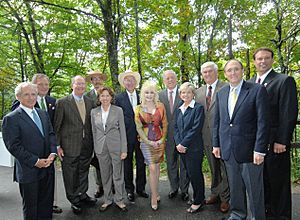
- Health Care: Alexander voted against the Patient Protection and Affordable Care Act in 2009. He believed it would lead to higher taxes and too much government control. He later helped write a different health care bill, but it did not pass.
- Working Together: Alexander was known for being a bipartisan senator, meaning he often worked with Democrats to pass laws. He believed that compromise was important for the government to work well.
- Environment: Alexander supported using nuclear power as a clean energy source. He was critical of wind turbines, worrying they were unattractive and could harm birds. He proposed a plan called the "New Manhattan Project for Clean Energy" to fund research into new energy technologies.
- Supreme Court: In 2016, he said the Senate should wait for the next president to choose a new Supreme Court justice. In 2020, he supported President Trump's choice to fill a vacancy on the court just before an election.
Personal Life

In 1969, Alexander married Leslee "Honey" Buhler. They met at a softball game for Senate workers. They had four children together.
Alexander is a skilled pianist who plays both classical and country music. He started playing the piano when he was three years old. In 2007, he even played piano on a new recording of the famous song "Tennessee Waltz" with singer Patti Page.
He is also an Eagle Scout and has been a member of the Presbyterian Church for many years.
Electoral history
| Tennessee US Senate election, 2014 | |||||
|---|---|---|---|---|---|
| Party | Candidate | Votes | % | ±% | |
| Republican | Lamar Alexander | 849,748 | 61.9 | ||
| Democratic | Gordon Ball | 437,175 | 31.8 | ||
| Tennessee US Senate election, 2008 | |||||
|---|---|---|---|---|---|
| Party | Candidate | Votes | % | ±% | |
| Republican | Lamar Alexander | 1,571,637 | 67.3 | +13.0 | |
| Democratic | Bob Tuke | 762,779 | 32.6 | ||
| Tennessee US Senate election, 2002 | |||||
|---|---|---|---|---|---|
| Party | Candidate | Votes | % | ±% | |
| Republican | Lamar Alexander | 888,223 | 54.3 | ||
| Democratic | Bob Clement | 726,510 | 44.2 | ||
| Tennessee gubernatorial election, 1982 | |||||
|---|---|---|---|---|---|
| Party | Candidate | Votes | % | ±% | |
| Republican | Lamar Alexander | 737,693 | 59.56 | +3.72 | |
| Democratic | Randy Tyree | 500,937 | 40.44 | ||
| Tennessee gubernatorial election, 1978 | |||||
|---|---|---|---|---|---|
| Party | Candidate | Votes | % | ±% | |
| Republican | Lamar Alexander | 661,959 | 55.84 | ||
| Democratic | Jake Butcher | 523,495 | 44.16 | ||
| Tennessee gubernatorial election, 1974 | |||||
|---|---|---|---|---|---|
| Party | Candidate | Votes | % | ±% | |
| Democratic | Ray Blanton | 576,833 | 55.88 | ||
| Republican | Lamar Alexander | 455,467 | 44.12 | ||
Images for kids
-
Alexander with President Donald Trump in 2019
See also
 In Spanish: Lamar Alexander para niños
In Spanish: Lamar Alexander para niños
 | Jessica Watkins |
 | Robert Henry Lawrence Jr. |
 | Mae Jemison |
 | Sian Proctor |
 | Guion Bluford |


